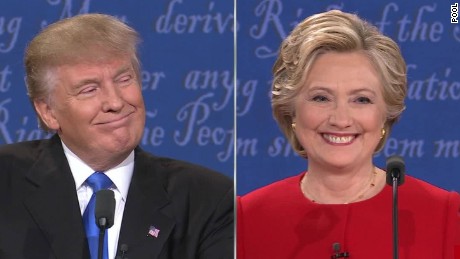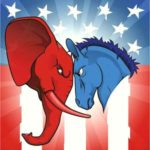The prevailing wisdom among Republican pundits about Monday night’s presidential debate was that Donald Trump got off to a strong start, proved effective in the first 15 minutes when talking about trade and the economy, then experienced a slow slide for the final hour or so.
Except that version of the truth ignores the fact that, during his best moments, Trump spouted numerous mistruths – and a few whoppers – about trade that amounted to his typical fear-mongering on this issue. Hillary Clinton also tossed out a few bits of nonsense during that segment too.
This inability to have a straightforward debate on trade, without coddling voters with misleading populist messages, should be especially disappointing to voters in Michigan and the Upper Midwest.
When the candidates don’t look at both sides of the ledger, they miss the other side of the story – exporting.
Many Michiganders would be surprised to learn that the state of Michigan has one of the largest foreign export economies in the nation:
Michigan exported $53.2 billion in goods in 2015, up by a third worldwide over the past decade. More than 70 percent of those exports were shipped to countries that have free-trade agreements with the U.S.
Michigan ranks No. 6 in the nation in export-related jobs (270,240) among the 50 states and ranks third in the biggest gains in export-related jobs (63,000) since 2009.
While some states enjoy geographical advantages for shipping overseas, Michigan stands at No. 2 for exported manufactured goods among states without an ocean port. Overall, 14,843 Michigan companies export goods across the globe.
Charles Ballard, an economist at Michigan State University, recently warned that “the rhetoric on trade in the presidential campaign has been often misleading, and sometimes dangerous.”
Ignoring the full set of facts, Trump is tapping into the electorate’s globalization anxiety and Clinton is trying to present a more low-key version of the same message.
For example, Trump said in Monday’s debate that the Chinese are “using our country as a piggy bank to rebuild China.” In fact, a report released just last week found that China now spends more in the world than the world spends in China. One of Michigan’s top experts on doing business in China, Tom Watkins, points out that, for the first time, Chinese companies have invested more abroad than foreign companies have invested in China.
The data shows overseas investment by China rose 18.3% to a record $145 billion last year, compared to $135.6 billion of foreign investment in China. This new trend comes as China’s economy last year grew at its slowest pace in 25 years.
Slipping up on the basics
In another bit of bloviating last night, Trump said of outsourcing by U.S. companies, “They’re leaving, and they’re leaving in bigger numbers than ever.” No, the latest numbers give an indication that China is losing factories and there’s some evidence of companies moving back to the U.S.
On the basic issue of the U.S. trade deficit, Trump continues to get it wrong. The Republican nominee said in the debate that the U.S. has “a trade deficit with all of the countries that we do business with, of almost $800 billion a year.” Actually, the U.S. trade deficit for all goods and services was $531 billion in 2015 – still too high, but way less than Trump claims.
One of Trump’s whoppers was when he said that Trump was right in saying that Ford is moving its small-car division overseas, but wrong in claiming that as a result, thousands of jobs are leaving Michigan and Ohio. Ford’s CEO has said that not a single job will be lost in the U.S. He went on Twitter last night, in the role of fact-checker, to emphasize that point.
Trump again made his claim that NAFTA was the “single worst trade deal ever approved in this country.” Studies have shown that unraveling the full impact of NAFTA, including the fact that it’s been a boon for the U.S. agriculture industry, is complicated. But the trade agreement was about a wash, perhaps a slight boost for the overall economy.
The number of auto jobs located in the U.S remains about the same as in 1997, when the full effects of NAFTA kicked in, and when the U.S. and the Michigan economy were stronger than today.
Clinton equally ignorant
Clinton demonstrated that she can be equally ignorant on trade issues when she boasted that, as a senator, she voted against CAFTA, the Central American Free Trade Agreement. She and Trump both seem unaware that the post-NAFTA trade agreements, mostly with Latin American countries, were big improvements over the flaws in the pact with Mexico and Canada.
Overall, 14 of the 17 post-NAFTA agreements have produced net gains for the United States, generating a collective trade surplus of $85 billion.
Another area where Clinton looks inept is when talking about her opposition to the pending Trans-Pacific Partnership agreement with Asian and Pacific Rim nations. In the debate, she couldn’t manage to admit that she changed positions on the “gold standard” TPP. She should have admitted that she was right the first time.
Most voters already know about Clinton’s mega-flip-flop on TPP and Trump’s Armageddon-like tone on all things free trade. The TV audience would have been better served by a discussion acknowledging that global trade is a two-way street – imports and exports – and the U.S., with the most advanced economy in the world and few trade barriers, stands to gain in any strongly crafted trade agreement.
The TPP would eliminate over time 18,000 tariffs among the 12 countries, including thousands applied to U.S. agricultural, industrial, medical and high-tech products. Debate moderator Lester Holt might have asked the two candidates why they are so opposed to TPP when supporters of the pact include more than 400 U.S. business organizations – ranging from the U.S. Chamber of Commerce to the Farm Bureau to the National Association of Manufacturers – which represent tens of thousands of employers.
It would also be worth pointing out that President Obama and traditional pro-business Republicans are among TPP’s strongest backers, in part because it would put the United States in a strong strategic position in the Pacific Rim area compared to China.
Yes, that’s the same Chinese government that Trump wants to protect us from, to free us from their death grip. And those 12 potential trading partners are many of the same countries that Clinton developed friendly relationships with when she was the leader of State Department, not a presidential candidate trying to match her adversary in the pandering department.





